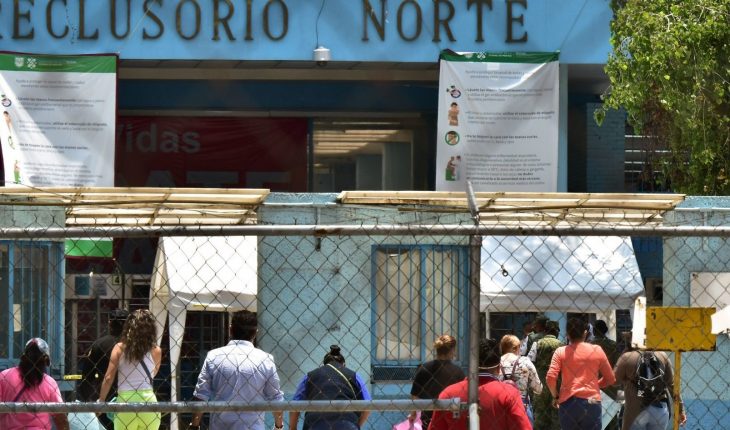Most prisons in Mexico do not have sufficient input capacity, medical equipment and infrastructure to deal with the COVID-19 pandemic, according to a report by the National Commission on Human Rights (CNDH).
The agency conducted an analysis of how the country’s Prison Centres implement health emergency measures to prevent and prevent COVID infections.
According to CNDH data, as of 1 July, 660 cumulative confirmed cases of COVID in prisons in prisons, as well as 104 deaths.
Overcrowding is one of the factors that has led to the spread of the virus in Mexican prisons, since of the 296 prisons that exist, 115 have overpopulation.
“A constant detected in most prisons in the country was that it was not possible to abide by the “healthy distance” measure derived from overpopulation and overcrowding in some spaces,” the study notes.
Against this background, the CNDH notes that the COVID pandemic “reached and exceeded” the measures established by the health authorities to prevent contagion within prisons.
Read: Lack of evidence prevents you from knowing the impact of COVID-19 on prisons
In addition to overpopulation, in most cases, the CNDH detected a lack of medicines and medical equipment; poor and unhealthy facilities; failures in access to safe water and sanitation, as well as the invisibilization of vulnerable groups within prisons, such as people with disabilities or chronic diseases.
At the time of the monitoring, CNDH staff noted that most of the centres visited “tests for COVID-19 were not being applied”.
“Basic non-equipped medical infrastructures were also identified
requirements and emergency needs” for care
COVID cases, and insufficient ambulances.
One of the most worrying cases was reported at the Puebla State Centre for Social Reintegration, as no action was even taken to verify compliance with general cleanliness and hygiene measures among detainees.
While medical staff said they do not have the necessary inputs to deal with the pandemic, nor are they aware of the protocols established by the pandemic.
In the dining room, CNDH staff identified agglomerations and reported that the “healthy distance” measure is not respected.
Disorganization was also detected in the safekeeping and care of positive COVID cases, on the one hand patients did not have protective inputs, while people waiting to visit them were overcrowded or having contact with others bringing them supplies and products.
Read: Amnesty’s law will only remove 7% of prisoners from jail and releases would take months
These deficiencies are reflected in the current situation in Puebla, which ranks first by number of COVID cases in its prisons with 195 confirmed cases and 24 deaths.
Jalisco follows, with 101 confirmed cases and 5 deaths; Mexico City, with 75 confirmed cases and 5 deaths, and Chihuahua with 58 positives and 4 deaths.
Report of national monitoring by #COVIDー19 in prisons, as of July 01, 2020: pic.twitter.com/y5c0itGo6x
— CNDH in Mexico (@CNDH) July 1, 2020
In its report, the CNDH states that while the health crisis made it possible to identify the shortcomings of detention centres, failure to address them would be a violation of the human rights of persons deprived of liberty; and the virus would also spread exponentially.
Some have done well
Since last March, the CNDH issued a number of precautionary measures to prevent contagion, and although not all centres have been implemented, there are some exceptions.
In the document, the agency provides a detailed state-by-state report on the measures that are applied in the detention centres.
The agency highlighted the cases of Sonora and Mexico City, where they carry out actions to contain not only the spread of coronavirus, but the anxiety that the private population of freedom might suffer.
Read: Deaths in prisons tripled in May, amid emergency by COVID
In addition, most prisons in these states have Protocols of Action to address the COVID-19 health emergency and filters for the detection of symptoms.
Another good example was observed at the Women’s Social Reintegration Centre in
Atlacholoaya, Morelos, as they carry out their activities of common areas and workshops in a staggered manner and by schedules to avoid crowds.
In this sense, the states with the least confirmed cases are Morelos (1 case), Durango (1 case) and San Luis Potosí (2 cases).
The CNDH will continue regular supervision at detention centres across the country with the aim of improving the living conditions of persons deprived of their liberty.
What we do in Animal Político requires professional journalists, teamwork, dialogue with readers and something very important: independence. You can help us keep going. Be part of the team.
Subscribe to Animal Politics, receive benefits and support free journalism #YoSoyAnimal.





